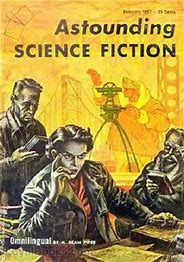OK. I have now read H. Beam Piper's "Omnilingual." So what do we think of it?
First, since we are on Poul Anderson Appreciation, are Piper and Anderson comparable? Terrohuman History and Technic History? Paratime Police and Time Patrol? I have read almost no Piper so cannot comment any further.
"Omnilingual":
yet another extinct humanoid Martian race, including Canal Builders;
strangely, "Luna" misnamed "Lunar," an English adjective instead of a Latin noun, the same mistake as in the Dan Dare comic strip;
the story is about how to translate Martian.
It seems too easy. These Martians sound like an ancient Terrestrial civilization, not like an extra-terrestrial species. A University library has survived, its books and periodicals printed on something more durable than paper. The language is alphabetical with consonants and vowels (somehow) distinguishable. Texts read from left to right with gaps between words. The number system is decimal with a stylized hook meaning "plus" and a stylized knife meaning "minus." The year is divided into ten nearly equal months named "First" to "Tenth." The illustrated Periodic Table and other such scientific diagrams are visually recognizable with explanatory words composed of affixes and suffixes below them.
But how will the explorers translate the many other words that do not have scientific or mathematical meanings?

5 comments:
Kaor, Paul!
I thought Piper's point was clear and reasonable: once some kind of text in a non-human language was translated with reasonable accuracy further deciphering and understanding of that language would grow exponentially.
Anderson's "The Word to Space" also touches on questions of how best to understand a non-human language. And "A Tragedy of Errors" revolves around the problems caused by changes in a human language.
Ad astra! Sean
In some of Piper's stories, humanity as the descendents of a just barely successful colonization from a dying Mars is part of the backstory. *Very* implausible, but it makes sense of the too human looking Martians of 'Omnilingual'. Also note that the story was written just before space probe flybys of Mars made the idea of habitable ( or geologically recently habitable) Mars implausible.
However the main point of the story remains if the Martians are more plausibly non-humanoid. Positional notation for numbers is very likely to be devised by any culture eventually. A different number base would be a very minor bump in the road to reading a alien number system.
The main point is that any culture with 19th century or later science will write down things like the periodic table of the elements that provide a starting point for deciphering the writing system.
Science in an 'omnilingual' for an unknown language like the Rosetta stone was a 'bilingual' for the unknown language of ancient Egyptian.
Kaor, Jim!
Very good! You clarified what I was trying to say. Yes, I agree any alien race which achieved at least a 19th century level of science should have its own period table of the elements. That, along with deciphering non-human numbering systems, should help with learning to read alien languages
Ad astra! Sean
Yup, it's a good story. IIRC, Poul liked Piper's stuff.
Kaor, Mr. Stirling!
I enjoyed the too few short stories of Piper that I read, and I did read the first two of his Little Fuzzy books. Alas, I discarded the Fuzzy books due to finding them too sappy sentimental, which I now regret doing.
Ad astra! Sean
Post a Comment